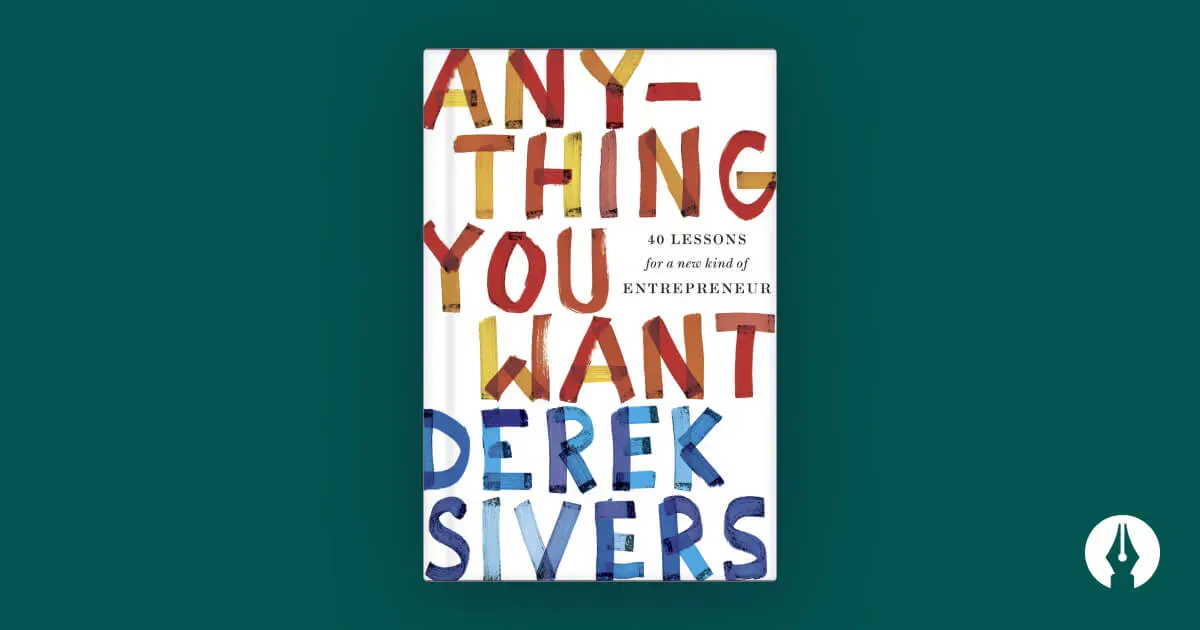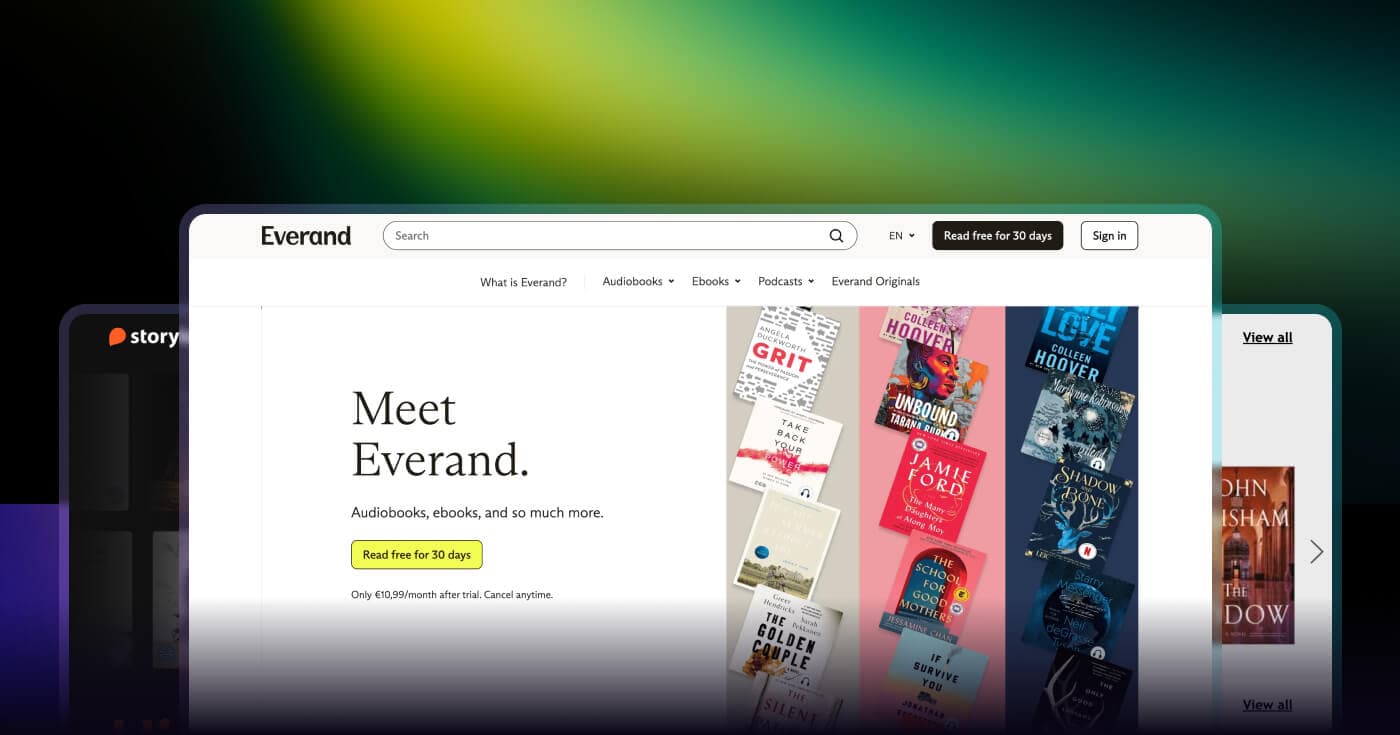Anything You Want Summary (Review & Book Notes)
A great short book that teaches you that you can get anything you want out of life if you do things your way (ergo the name of the book).

A great short book that teaches you that you can get anything you want out of life if you do things your way (ergo the name of the book).

A great short book that teaches you that you can get anything you want out of life if you do things your way (ergo the name of the book). You don’t need to get funding, or be famous, or become a millionaire before 30. But you can. It depends on what you want. Highly recommended, especially to the lost entrepreneur.
Author: Derek Sivers
Originally published: 2015
Pages: 96
Genre: Business
Goodreads rating: ⭐️ 4.09/5
🎧 Listen for free on Everand (plus 1+ million other books)
Most people don’t know why they’re doing what they’re doing. They imitate others, go with the flow, and follow paths without making their own.
They spend decades in pursuit of something that someone convinced them they should want, without realizing that it won’t make them happy.
Don’t be on your deathbed someday, having squandered your one chance at life, full of regret because you pursued little distractions instead of big dreams.
You need to know your personal philosophy of what makes you happy and what’s worth doing.
In the following stories, you’ll notice some common themes. These are my philosophies from the ten years I spent starting and growing a small business.
When you make a business, you get to make a little universe where you control all the laws. This is your utopia. When you make it a dream come true for yourself, it’ll be a dream come true for someone else, too.
If you think your life’s purpose needs to hit you like a lightning bolt, you’ll overlook the little day-to-day things that fascinate you.
If you think revolution needs to feel like war, you’ll overlook the importance of simply serving people better.
When you’re on to something great, it won’t feel like revolution. It’ll feel like uncommon sense.
Success comes from persistently improving and inventing, not from persistently doing what’s not working.
We all have lots of ideas, creations, and projects. When you present one to the world, and it’s not a hit, don’t keep pushing it as-is. Instead, get back to improving and inventing.
Present each new idea or improvement to the world. If multiple people are saying, “Wow! Yes! I need this! I’d be happy to pay you to do this!” then you should probably do it. But if the response is anything less, don’t pursue it.
When deciding whether to do something, if you feel anything less than “Wow! That would be amazing! Absolutely! Hell yeah!”—then say “no.”
Every event you get invited to. Every request to start a new project. If you’re not saying “HELL YEAH!” about it, say “no.”
By not having any money to waste, you never waste money.
Never forget that absolutely everything you do is for your customers. Make every decision—even decisions about whether to expand the business, raise money, or promote someone—according to what’s best for your customers.
If you’re ever unsure what to prioritize, just ask your customers the open-ended question, “How can I best help you now?” Then focus on satisfying those requests.
Watch out when anyone (including you) says he wants to do something big, but can’t until he raises money.
It usually means the person is more in love with the idea of being big big big than with actually doing something useful. For an idea to get big big big, it has to be useful. And being useful doesn’t need funding.
If you want to be useful, you can always start now, with only 1 percent of what you have in your grand vision. It’ll be a humble prototype version of your grand vision, but you’ll be in the game. You’ll be ahead of the rest, because you actually started, while others are waiting for the finish line to magically appear at the starting line.
For example, let’s say you have a vision of making an international chain of enlightened modern schools. You picture it as a huge, world-changing organization, with hundreds of employees, dozens of offices, and expensive technology. But instead of waiting for that, you start by teaching somebody something this week. Find someone who will pay to learn something, meet him anywhere, and begin. It will be nothing but you, a student, and a notebook, but you’ll be in business, and you can grow it from there.
If you want to make a movie recommendation service, start by telling friends to call you for movie recommendations. When you find a movie your friends like, they buy you a drink. Keep track of what you recommended and how your friends liked it, and improve from there.
Want to start a new airline? Next time you’re at the airport when a flight is cancelled, offer to everyone at the gate that you’ll lease a small plane to fly to their destination if they will split the costs. (This is how Richard Branson started Virgin Airlines.)
Starting small puts 100 percent of your energy on actually solving real problems for real people. It gives you a stronger foundation to grow from. It eliminates the friction of big infrastructure and gets right to the point. And it will let you change your plan in an instant, as you’re working closely with those first customers telling you what they really need.
Ideas are just a multiplier of execution It’s so funny when I hear people being so protective of ideas (especially people who want me to sign an NDA before they tell me about the simplest ideas).
To me, ideas are worth nothing unless they are executed. They are just a multiplier. Execution is worth millions. Explanation:
To make a business, you need to multiply the two components.
The most brilliant idea, with no execution, is worth $20.
The most brilliant idea takes great execution to be worth $20,000,000.
That’s why I don’t want to hear people’s ideas. I’m not interested until I see their execution.
As your business grows, never let the leeches sucker you into all that stuff they pretend you need.
They’ll play on your fears, saying that you need this stuff to protect yourself against lawsuits. They’ll scare you with horrible worst-case scenarios. But those are just sales tactics. You don’t need any of it.
Imagine that you have designed your business to have NO big clients, just lots of little clients.
When you build your business on serving thousands of customers, not dozens, you don’t have to worry about any one customer leaving or making special demands. If most of your customers love what you do, but one doesn’t, you can just say goodbye and wish him the best, with no hard feelings.
Have the confidence to know that when your target 1 percent hears you excluding the other 99 percent, the people in that 1 percent will come to you because you’ve shown how much you value them.
I used to take voice lessons from a great teacher named Warren Senders.
For each lesson, I’d bring in one song I was trying to improve.
First, I’d sing it for him as written.
Then he’d say, “OK, now do it up an octave.”
“Uh… up an octave? But I can’t sing that high!”
“I don’t care! Do it anyway! Go! One… two… three… four…”
I’d sing the whole song again, in screeching squeaking falsetto, sounding like an undead cartoon mouse. But by the second half of the song, it was almost charming.
Then he’d say, “OK, now do it down an octave.”
“Down an octave? But I don’t think I can!”
“Doesn’t matter! Go! One… two… three… four…”
I sounded like a garbage disposal or lawn mower, but he made me sing the whole song that way.
It was the clearest proof that what I thought was “the” way the song went was really just one of an infinite number of options.
I’m taking an entrepreneurship class now. I’ve never studied business before.
We analyzed a business plan for a mail-order pantyhose company. Like all business plans, it proposed only one plan.
After reading the whole thing, I felt like saying things my old voice teacher would have said:
You can’t pretend there’s only one way to do it. Your first idea is just one of many options. No business goes as planned, so make ten radically different plans.
Never forget why you’re really doing what you’re doing.
Are you helping people? Are they happy? Are you happy? Are you profitable? Isn’t that enough?
It’s another Tao of business: Set up your business like you don’t need the money, and it’ll likely come your way.
When you make a business, you’re making a little world where you control the laws. It doesn’t matter how things are done everywhere else. In your little world, you can make it like it should be.
When you’re thinking of how to make your business bigger, it’s tempting to try to think all the big thoughts and come up with world-changing massive-action plans. But please know that it’s often the tiny details that really thrill people enough to make them tell all their friends about you.
There’s a benefit to being naïve about the norms of the world— deciding from scratch what seems like the right thing to do, instead of just doing what others do.
No matter what business you’re in, it’s good to prepare for what would happen if business doubled.
Have ten clients now? How would it look if you had twenty at once? Serving eighty customers for lunch each day? What would happen if 160 showed up?
Notice that “more of the same” is never the answer. You’d have to do things in a new way to handle twice as much business. Processes would have to be streamlined.
Never be the typical tragic small business that gets frazzled and freaked out when business is doing well. It sends a repulsive “I can’t handle this!” message to everyone.
Instead, if your internal processes are always designed to handle twice your existing load, it sends an attractive “come on in, we’ve got plenty of room” message to everyone.
But the whole point of doing anything is because it makes you happy! That’s it!
You might get bigger faster and make millions if you outsourced everything to the experts. But what’s the point of getting bigger and making millions? To be happy, right?
In the end, it’s about what you want to be, not what you want to have.
To have something (a finished recording, a business, or millions of dollars) is the means, not the end. To be something (a good singer, a skilled entrepreneur, or just plain happy) is the real point. When you sign up to run a marathon, you don’t want a taxi to take you to the finish line.
Most self-employed people get caught in the delegation trap.
You’re so busy, doing everything yourself. You know you need help, but to find and train someone would take more time than you have. So you keep working harder, until you break.
Here’s my little tale of how I broke into the delegation mindset:
In 2001, CD Baby was three years old. I had eight employees, but I was still doing “everything else” myself, working 7 a.m. to 10 p.m., seven days a week. Everything still went through me.
Every five minutes, my employees had a question for me:
“Derek, some guy wants to change the album art after it’s already live on the site. What do I tell him?”
“Derek, can we accept wire transfer as a form of payment?”
“Derek, someone placed two orders today, and wants to know if we can ship them together as one, but refund him the shipping cost savings?”
It was hard to get anything done while answering questions all day.
I felt like I might as well just show up to work and sit on a chair in the hallway, just answering employees’ questions, full-time.
I had to make myself unnecessary to the running of my company.
The next day, as soon as I walked in the door, someone said, “Derek, someone whose CDs we received yesterday has now changed his mind and wants his CDs shipped back. We’ve already done the work, but he’s asking if we can refund his setup fee since he was never live on the site.”
This time, instead of just answering the question, I called everyone together for a minute.
I repeated the situation and the question for everyone.
I answered the question, but more important, I explained the thought process and philosophy behind my answer.
“Yes, refund his money in full. We’ll take a little loss. It’s important to always do whatever would make the customer happiest, as long as it’s not outrageous. A little gesture like this goes a long way toward him telling his friends we’re a great company. Everyone always remember that helping musicians is our first goal, and profit is second. You have my full permission to use that guideline to make these decisions yourself in the future. Do what makes the musicians happiest. Make sure everyone who deals with us leaves with a smile.”
I asked around to make sure everyone understood the answer.
I asked one person to start a manual, write down the answer to this one situation, and write down the philosophy behind it.
After two months of this, there were no more questions.
Then I showed someone how to do the last of the stuff that was still my job. As part of learning it, he had to document it in the manual, and then show it to someone else, too. (Learn by teaching.)
There’s a big difference between being self-employed and being a business owner.
Being self-employed feels like freedom until you realize that if you take time off, your business crumbles.
To be a true business owner, make sure you could leave for a year, and when you came back, your business would be doing better than when you left.
After your business has been up and running a while, you’ll hit an interesting crossroads.
Everyone assumes that as the owner of the company, you’ll be the traditional CEO, having high-powered lunches with other high-powered CEOs and doing all the big business deals.
But what if you don’t like doing that? What if what you love the most is the solitude of the craft? Or talking to customers?
Never forget that you can make your role anything you want it to be. Anything you hate to do, someone else loves. So find that person and let him do it.
For me, I loved sitting alone and programming, writing, planning, and inventing. Thinking of ideas and making them happen. This makes me happy, not business deals or management. So I found someone who liked doing business deals and put him in charge of all that.
If you do this, you’ll encounter a lot of pushback and misunderstanding, but who cares? You can’t just live someone else’s expectation of a traditional business. You have to just do whatever you love the most, or you’ll lose interest in the whole thing. On a similar note, people also assume that you want to be big big big—as big as can be. But do you, really?
Huge growth means lots of meetings, investors, bankers, media, and answering to others. It’s quite far from the real core of the business.
Make sure you know what makes you happy, and don’t forget it.
Trust, but verify. Remember it when delegating. You have to do both.
When I decided to sell CD Baby, I already had enough.
I live simply. I don’t own a house, a car, or even a TV. The less I own, the happier I am. The lack of stuff gives me the priceless freedom to live anywhere anytime.
So I didn’t need or even want the money from the sale of the company. I just wanted to make sure I had enough for a simple, comfortable life. The rest should go to music education because that’s what made such a difference in my life.
It’s not that I’m altruistic. I’m sacrificing nothing. I’ve just learned what makes me happy. And doing it this way made me the happiest.
I get the deeper happiness of knowing that the lucky streak I’ve had in my life will benefit tons of people—not just me.
I get the pride of knowing I did something irreversibly smart before I could change my mind.
I get the safety of knowing I won’t be the target of wrongful lawsuits, since I have very little net worth.
I get the unburdened freedom of having it out of my hands so I can’t do something stupid.
But most of all, I get the constant priceless reminder that I have enough.
Business is as creative as the fine arts. You can be as unconventional, unique, and quirky as you want. A business is a reflection of the creator.
No matter which goal you choose, there will be lots of people telling you you’re wrong.
Just pay close attention to what excites you and what drains you. Pay close attention to when you’re being the real you and when you’re trying to impress an invisible jury.
Even if what you’re doing is slowing the growth of your business—if it makes you happy, that’s OK. It’s your choice to remain small.

Discover the best ebook subscription apps for 2026. Compare pricing, features, and catalogs of top platforms like Kindle Unlimited, Kobo Plus, and Everand to find your perfect reading service.

Discover the top 10 book making apps of 2025 that streamline writing, formatting, and publishing processes for authors and publishers.

If you’re looking for a list of the best books on sociology, then you have come to the right place. Here are the top 35 books about sociology.